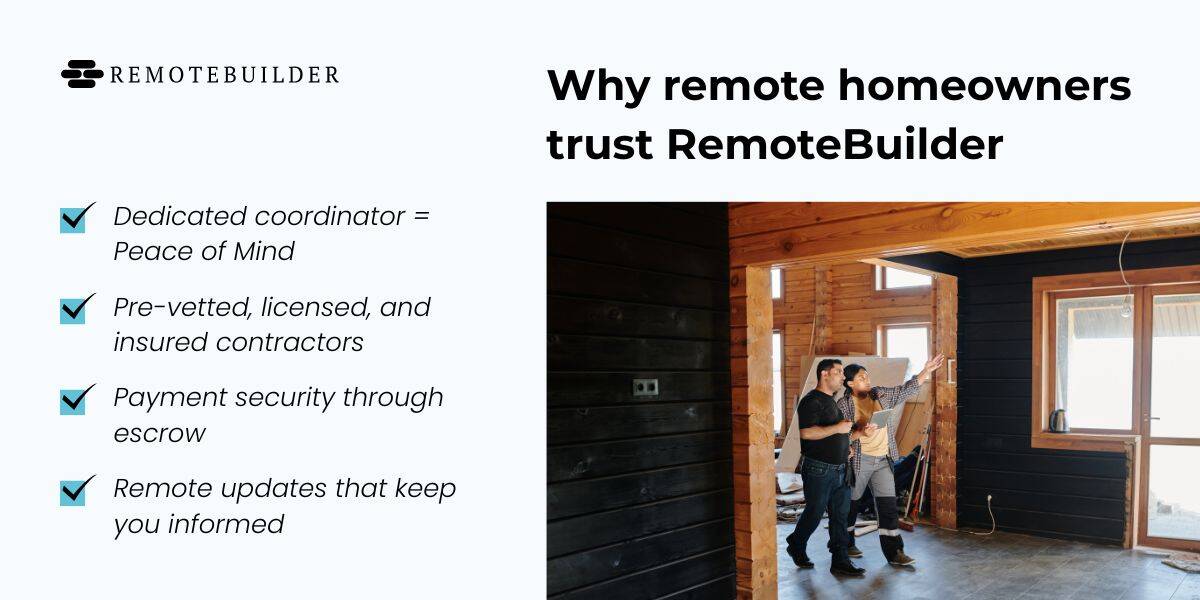Hiring a contractor is one of the most critical decisions you’ll make during a home renovation, especially when you’re not physically present to oversee the work. For remote homeowners like Tony, the risks are amplified: missed deadlines, bloated costs, shoddy workmanship, and poor communication can derail your investment and your peace of mind.
That’s why asking the right questions before hiring a contractor isn’t just a good idea—it’s essential. A quick phone call and a polished website aren’t enough. You need real answers, clear expectations, and a contractor who understands the unique demands of remote renovation management.
If you’re still early in your search, here’s a full guide on how to find the right contractor for your renovation project.
This guide walks you through 15 smart questions to ask contractors, the same ones we recommend to our clients at RemoteBuilder. Whether you’re renovating a vacation home across the country or managing a rental property from overseas, these questions will help you avoid red flags, ensure accountability, and choose a contractor who delivers—no matter where you are.
Pro tip: Before signing anything, bookmark this list. Or better yet, let RemoteBuilder handle it all, from contractor vetting to payment protection through escrow.
Why it’s critical to know what questions to ask contractors
Renovating a home is a significant investment, and for remote homeowners, the stakes are even higher. Without being physically present, you’re relying heavily on your contractor’s integrity and communication. Unfortunately, contractor fraud and disputes are more common than many realize.
The cost of contractor fraud
- Prevalence of scams: Since 2007, over 109,000 home improvement scams have been reported to the Federal Trade Commission, averaging more than 6,000 incidents annually.
- Financial impact: Americans have lost approximately $206.9 million to home improvement scams over the past 14 years, with losses peaking during the pandemic years.
- Recent surge: In 2023 alone, there were around 83,000 reports of home repair and improvement scams, indicating a significant rise in fraudulent activities.
Disputes and delays
- High-value disputes: The average value of construction disputes in North America rose by 42% in recent years, reaching $42.8 million, highlighting the potential financial risks involved.
- Extended resolution times: The average time to resolve construction disputes has increased by nearly 15%, often taking over a year to conclude.
Stress and satisfaction
- Homeowner concerns: A survey revealed that 88% of homeowners found remodels stressful, with 66% identifying finding a quality contractor as their biggest concern.
These statistics underscore the importance of thoroughly vetting contractors, especially when managing projects remotely. By asking the right questions, you can mitigate risks, ensure transparency, and protect your investment.
15 Essential questions to ask contractors
Choosing the right contractor starts with asking the right questions, especially when you’re managing your renovation from hundreds (or thousands) of miles away. These 15 questions are grouped into key categories to give you a 360° view of credibility, communication, risk management, and transparency.
Business credibility
1. Are you licensed and insured in this state?
Hiring an unlicensed contractor is a legal and financial risk. Ask for proof of general liability insurance and workers’ comp. Confirm their license status through your state’s contractor board.
How long have you been in business, and can you provide references?
Experience doesn’t always equal quality, but longevity can signal reliability. Ask for 3–5 recent references—ideally ones who hired them for remote or absentee projects.
Project clarity
3. What exactly is included in the project scope?
Avoid vague scopes. A detailed written estimate should list materials, labor, and exclusions. If you’re remote, request visuals or itemized breakdowns you can review digitally.
4. What’s the projected timeline, and how do you handle delays?
Ask for a realistic timeline with start and end dates. Clarify how delays are communicated and resolved. For remote homeowners, consistency in updates is non-negotiable.
5. Who will be managing my project day-to-day?
You need to know who’s running the job. Is it the person you met, or someone else? Request direct contact info for the lead on-site.
Communication and updates
6. How often will I get updates, and in what format?
For remote renovations, this is critical. Will you receive updates weekly? Biweekly? Via email, text, or video walkthroughs? Set the expectation early.
7. What tools or platforms do you use to communicate?
Contractors using project management tools (like Buildertrend or CoConstruct) are often more organized and transparent, ideal for remote oversight.
Track record
8. Can I speak to past clients who managed the project remotely?
Speaking with remote clients will give you real insight into their communication style and reliability from afar. Look for consistency in feedback.
9. Have you handled projects similar to mine in size and style?
Whether it’s a full gut renovation or a cosmetic update, you want someone familiar with your project’s scope.
Financial protection
10. What’s your payment schedule, and do you offer escrow?
Never pay the full amount upfront. Request a milestone-based payment plan. Bonus points if they accept escrow—a huge win for remote homeowners seeking protection.
11. How do you handle change orders and budget changes?
Unexpected changes happen. Ask how they document scope changes, and whether you’ll receive formal approval requests before added costs are incurred.
Risk and conflict management
12. What kind of warranty do you offer for your work?
Look for contractors who offer a minimum 1-year workmanship warranty—and get it in writing.
13. What happens if there’s a dispute?
Ask about their process for resolving issues. Do they have a formal dispute resolution plan? Who handles it?
Subcontractor oversight
14. Who will actually be doing the work, and how do you vet them?
Many contractors subcontract work. Ask how they select subcontractors, whether they’re insured, and how work quality is monitored.
Remote Transparency
15. How do you keep remote homeowners in the loop and accountable?
This is your “gut-check” question. Their answer should reflect empathy, organization, and a tech-enabled process. If they struggle to answer this, proceed with caution.
Mistakes to avoid when hiring a contractor
Even smart homeowners fall into costly traps when hiring contractors, especially when they’re managing projects remotely. Here are the most common mistakes to avoid if you want to stay on budget, on time, and stress-free.
1. Not getting a written contract
A handshake or casual email isn’t enough. A formal, signed contract should detail scope, materials, start and finish dates, payment terms, and how changes are handled. Without it, you have no legal protection if things go south.
Pro tip: If a contractor resists putting terms in writing, walk away.
2. Paying too much upfront
Never pay in full before the project starts. A standard payment structure involves a deposit, progress payments at milestones, and a final payment upon completion. Paying upfront eliminates your leverage and increases your risk, especially if you’re not onsite to monitor progress.
3. Ignoring red flags in communication
Delayed replies, vague answers, or overly aggressive sales tactics are red flags. If a contractor can’t communicate clearly before hiring, imagine what it’ll be like when issues arise mid-renovation.
4. Skipping the credentials check
Always verify licenses, insurance, and references. Don’t rely on Google reviews alone; ask for verifiable client contacts, especially other remote homeowners. Run their contractor license through your state’s board and confirm insurance coverage is active.
5. Not clarifying the change order process
Scope creep is a silent budget killer. Make sure your contractor outlines how they’ll document, price, and get your approval for changes. Without this, you could be blindsided by add-ons and delays.
6. Underestimating the challenges of remote oversight
Without a clear communication cadence and visibility into day-to-day work, you’re flying blind. Many homeowners assume they’ll get photo updates or calls, only to find out weeks later that progress has stalled—or worse, gone in the wrong direction.
These mistakes don’t just cost money—they erode trust and peace of mind. That’s why remote homeowners are turning to expert-managed renovation platforms like RemoteBuilder to avoid these pitfalls entirely.
👉 Ready to see how it works? Let’s dive into the next section.
Why remote homeowners trust RemoteBuilder
Managing a renovation from another city or country comes with real risks. From poor communication to payment disputes, remote homeowners face a higher chance of delays, budget overruns, and stressful surprises.
That’s where RemoteBuilder comes in.
We built RemoteBuilder specifically for homeowners who demand transparency, protection, and control, without needing to be on-site. Here’s how we eliminate the headaches that traditional contractor relationships often bring:
Dedicated coordinator = Peace of Mind
Every project comes with a dedicated project coordinator—your single point of contact from day one. They translate construction jargon, keep the contractor accountable, and make sure your requirements are met. No chasing updates, no wondering who’s in charge.
Pre-vetted, licensed, and insured contractors
We only work with fully licensed, insured, and background-verified professionals. These aren’t random names off a marketplace—they’re contractors we’ve screened based on past remote projects, communication practices, and client satisfaction.
Payment security through escrow
We don’t just say “trust us”—we protect your money. All payments go through a secure escrow system, meaning funds are only released once project milestones are approved by you. This prevents overpayment and gives you leverage.
Learn more about payment protection through escrow →
Remote updates that keep you informed
Contractors upload regular photo and video updates, organized by milestone. You can review progress from your phone or laptop—no guessing, no ghosting.
Imagine opening your inbox every Friday to a timeline update, complete with annotated images, video walk-throughs, and next steps. That’s the level of visibility we provide.
Built-in dispute resolution and issue management
If something goes wrong (and sometimes it does), our coordinators step in immediately. We manage the issue, document the gap, and either get it resolved or escalate it before it costs you time or money.
With RemoteBuilder, you don’t just hire a contractor—you get a renovation partner who speaks your language, protects your interests, and makes remote project management stress-free.
📞 Thinking about renovating from afar?
Make the smart move before you build
Hiring the right contractor isn’t about luck, it’s about right questions to ask contractors, that can protect your time, money, and peace of mind. For remote homeowners, this isn’t just a checklist—it’s a lifeline.
Let’s recap:
- Vet for licenses, insurance, and experience
- Get crystal clear on scope, timeline, and team
- Insist on remote-friendly communication tools
- Protect your investment with written contracts and escrow
- Avoid red flags like vague answers or full upfront payments
These 15 questions to ask contractors aren’t just a formality, they’re your first line of defense against delays, overcharges, and poor craftsmanship. But if managing all this remotely sounds overwhelming, you’re not alone, and you don’t have to do it alone.
Let RemoteBuilder ask the right questions for you
We’ve helped hundreds of homeowners successfully renovate from afar by:
- Vetting and managing contractors
- Coordinating updates and communication
- Escrowing payments for protection
- Resolving issues before they become problems
So if you’re planning a renovation and can’t be on-site every day, let us handle the stress so you don’t have to.







